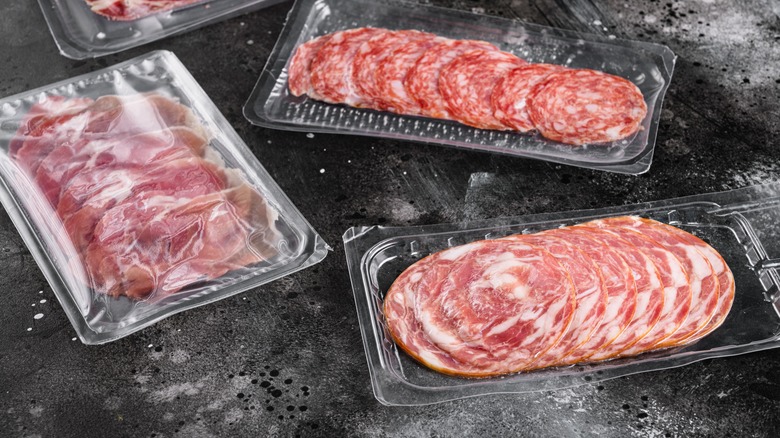The Best Deli Meats To Freeze And Save For Later
Whether on a charcuterie board, in an omelet or salad, or just part of your favorite sandwich, deli meats (and their leftovers) are versatile. However, despite their adaptability, they spoil quickly if left in the fridge. As a result, you'll likely want to freeze any uneaten deli meats before they go bad, notably if you've satisfied your cravings for a while. However, before throwing that remaining package of sliced ham, turkey, or salami into the nearest freezer, it should be noted that not all cold cuts are the same, and some will handle frozen storage better than others.
Granted, they all can be frozen for later use, but when it comes to extending their shelf life, water content and access to air are crucial factors to consider. As a result, dry-cured or fermented deli meats — such as salami, prosciutto, capicola, or pepperoni — are best suited for freezing. However, how they're stored plays a significant role in avoiding freezer burn.
Deli meats and freezer burn
An unopened store-bought package of lunch meat will typically last about two weeks when refrigerated. However, if frozen properly, it can last up to two months. This is because, as the program director at Stop Foodborne Illness, Vanessa Coffman, illustrates (via Martha Stewart), most pre-packaged deli meats are full of preservatives that "work by sucking up [any] available water in the meat...making it a tough environment for pathogenic and spoilage microorganisms to grow effectively."
However, as the United States Department of Agriculture indicates, unsealed packets of deli meat (like those you buy at a deli counter) only last about three to five days in a fridge (assuming that the temperature is set at 40 degrees Fahrenheit or lower). Incidentally, per the above Martha Stewart article, the vice president of food science, quality, and safety at ButcherBox, Catie Beauchamp, concurs with the USDA's assessment and explains that it's a result of air exposure and skin contact, which exposes the meats to more bacteria.
The same is valid with freezer burn. When frozen items are stored for long periods, they undergo a process known as sublimation, which happens when frozen products begin to lose their moisture because of the flow of air and an absence of humidity. As a result, water molecules travel to the surface, which not only dehydrates the product but also causes discoloration and the formation of ice crystals.
The best deli meats to freeze
Although the USDA illustrates that freezer burn isn't a health concern, dry-cured or fermented products, such as pepperoni, salami, capicola, and prosciutto, will hold up better and longer than water-rich sliced turkey or ham. Cured meats can last up to two months in the fridge, they can safely stay in your freezer for up to three months. According to Catie Beauchamp, this is because drying removes moisture and fermentation lowers the pH levels.
Nevertheless, take further measures to ensure a quality product after thawing by creating a double wrap around an item's packaging with aluminum foil, plastic wrap, or a plastic freezer bag. Moreover, meats that come in larger portions — like ham, pastrami, roast beef, and mortadella — can be frozen in larger pieces that can be thawed and sliced later. Still, it may be best practice to portion out sections in sizes you'll use, so you don't risk re-freezing as that may result in a degradation of their condition, especially after two hours.
Lastly, while there are a few ways to thaw deli meats, such as submerging them in cold water within sealed packaging, the safest method (which also requires the least work) is to pull them out the day before and place the items in your fridge. This will discourage your cold cuts from possibly entering the, as the USDA describes, "danger zone" — a temperature range between 40 and 140 degrees Fahrenheit where bacterial growth increases quickly.


